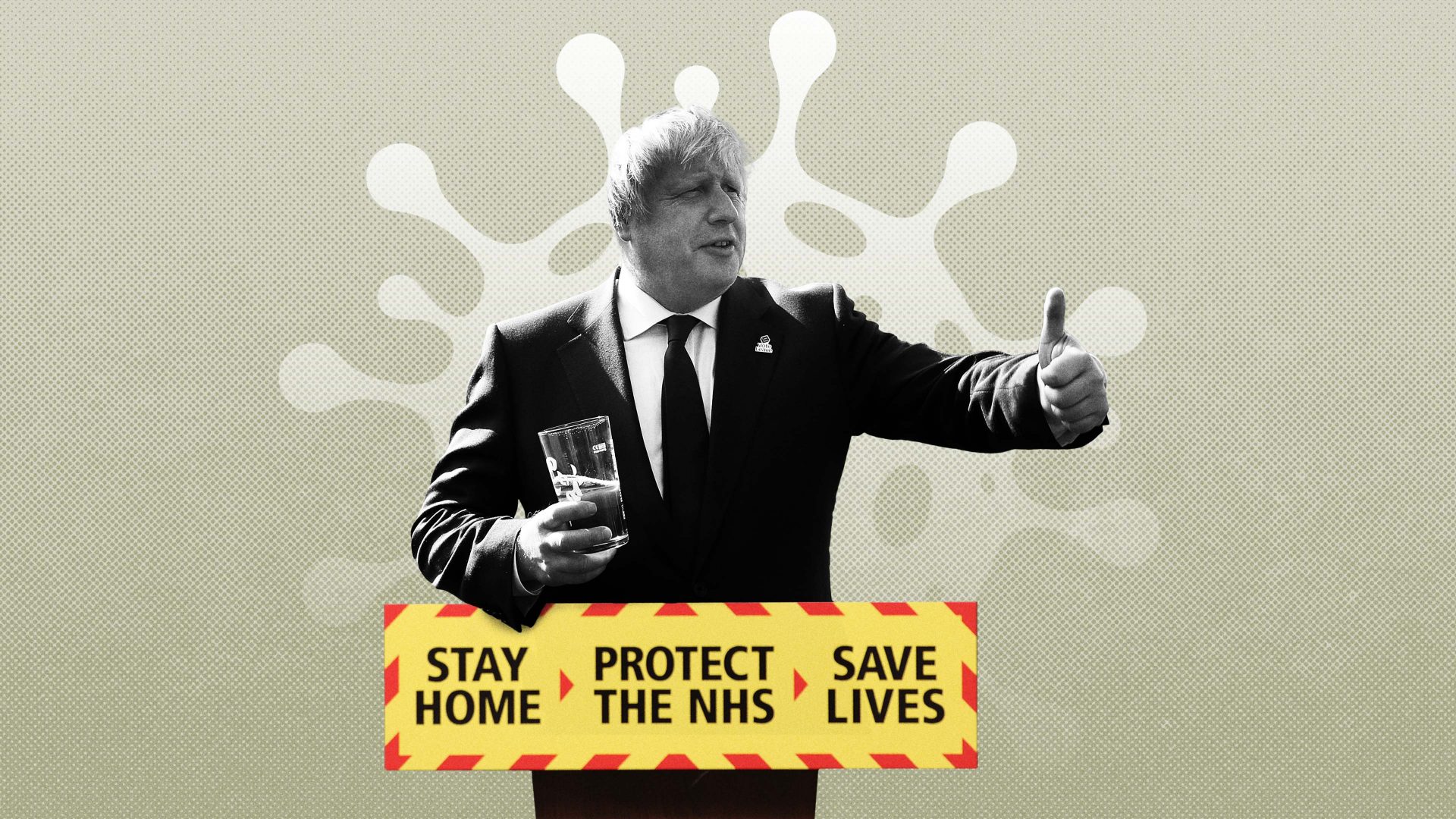Exchanges at prime minister’s questions were rowdier than usual and dominated by Louise Casey’s report on the Metropolitan Police. Who is to blame for the disastrous state of the capital’s police force? Keir Starmer said it was the government’s fault and the prime minister responded by blaming Sadiq Khan, the Labour mayor of London. The speaker seemed on the verge of losing control, as the two party leaders hammered away at one another on the question of law and order, and what to do with people in positions of authority who break the rules.
In completely unrelated events, it was also the day of Boris Johnson’s appointment with the Privileges Committee. He was there to face accusations that he lied to the Commons over lockdown parties at No10. He told the house several times that no parties took place at Downing Street during the lockdown period, and yet photographs of those parties are now widely available online. So it seems – hold onto your hats – that Boris Johnson was not telling the truth. But was it an accidental fib, or a reckless, intentional lie? That was the question that the committee wanted to unpick. The answer could have serious consequences for Johnson’s career, which he seems determined to prolong, despite widespread national feelings to the contrary.
The Privileges Committee room itself was a drab, grey-carpeted affair, a horse-shoe of MPs facing Johnson, who was seated at a desk the colour of balsa wood. Harriet Harman, the committee chair, was wearing an ominous-looking rope-thick silver chain around her neck as she got things under way. “If what ministers tell us is not the truth,” she said in her opening remarks, “we cannot do our job. Our democracy depends on trust that what ministers tell us in parliament is the truth.”
“Misleading intentionally or recklessly,” she said, “impedes the function of the house and is contempt”. The hearing, she said, “is about the truth.” She then pointed out that the Committee of seven MPs included four from the Conservative Party, to make clear its impartiality. She then used a large flat-screen television to play recordings of Johnson reassuring the Commons that “all guidance was followed completely at No10,” and that “there was no party”.
The recordings played, Harman asked how Johnson could possibly say all rules and guidance had been followed and that there were no parties, particularly when he was present at parties where the rules and guidance were obviously broken. Johnson frowned at her as she spoke. The scene was unmistakably that of a man on trial, a sense enhanced by Johnson’s swearing an oath on the Bible.
Then Johnson got to have his say. He talked seriously, with a robotic directness unusual for him. He claimed he had spoken in “good faith,” to Parliament. His argument was that at the time, people in No10 thought the rules had been followed, and so when Johnson said all rules had been followed it was a genuinely held belief. Johnson claimed that the committee had found nothing to prove that he had been told about any wrongdoing. “I received assurance,” he said, “that there was no rule breaking at No.10.”
“The committee is trying to mount an argument that I must have known,” about rule breaking, he said. But that was wrong. The photos, he said, “show me giving a few words of thanks at a work event.” They show events, he said, “that I was never fined for attending.” And anyway, he said, if the parties were against the rules, then other people would have known it too, including, he pointed out, “the current prime minister…” and just as he spoke those incendiary words the division bell rang, and proceedings were adjourned so that Johnson could step into the Commons to vote against Rishi Sunak’s Windsor Framework. It was the end of Round 1.
Fifteen minutes later, proceedings resumed. The culprit began by repeating his point that if he had known that these events were against the rules, then others including the current PM would have known it too. In other words, if I go down, so does Sunak. He then went on the attack, accusing the committee of not having any evidence that he lied to the Commons, and that if the committee was alleging deception, that means that all the civil servants in No10 must have lied too.
He then accused Harriet Harman of having pre-judged the evidence. “I said what I said in good faith,” he said, emphasising that his comments to parliament were based on his own knowledge and understanding. Things were turning towards the question of Johnson’s own subjective perception. “We’re talking about what I believed at the time.” There were flashes of anger. The facade of restraint was beginning to slip.
When asked by Bernard Jenkin, a Conservative committee member, whether a picture of a Downing Street gathering showed people obeying “the guidance” on social distancing, Johnson – who was in the picture, raising a glass – said the scene depicted did not violate any of the guidance. It was a leaving do, he said. “It didn’t occur to me for one second that it wasn’t necessary for work purposes,” said Johnson, frowning.
Well then, asked Jenkin, back when you were telling the country to socially distance, if someone had asked you whether leaving parties were allowed, what would you have said? That had Johnson stuttering. I’d tell them to follow the guidance, he said. It was a very weak moment. Shortly after, the division bell rang again and Johnson was off once more to vote against Sunak’s Northern Ireland bill. Despite Johnsons’ efforts, the bill eventually passed through the Commons with a colossal majority. An hour and half had gone by and things were not moving in Johnson’s favour.
Round three. Bernard Jenkin again: did Johnson recall describing one of the parties at No10 as: “Probably the most un-socially distanced gathering in the UK”? No. He didn’t remember that. Johnson then launched into a monologue, which was so long-winded and repetitive that Jenkin interrupted to tell him to shut up. There were more questions and by this time Johnson was karate-chopping his hand on the desk to emphasise his points.
Harman then moved the discussion onto yet more gatherings in No10, including Johnson’s own birthday party. Yvonne Fovargue, the Labour MP showed images of that party, which was attended by 17 people, “including your wife and interior designer”, she added. “Why did you think this was necessary for work purposes?”
“It seemed to me to be a proper thing to do,” said Johnson, adding that immediately after that party he went into a work meeting. Did your wife and interior designer also attend that meeting, asked Fovargue, witheringly. Johnson jabbered an unconvincing non-reply. “You didn’t reflect on the event afterwards?” asked Fovargue. “No, I didn’t,” said Johnson. “It didn’t strike me as being anything other than a perfectly normal, common-or-garden work event,” he said.
What about the email sent to 200 staff inviting them to a garden party and asking them to bring booze, asked Fovargue, in an excellent example of a question that contains its own answer. No one raised any concerns about that gathering either, said Johnson. Lee Cain, the former spin-doctor, may have been worried about it, Johnson accepted, but his concern was only with “the optics”. Well, Fovargue followed up, why would anyone be worried about “the optics” if the party was within the rules? He was getting angry again, and harrumphed that it was all a work event.
There were trestle tables at that party, said Fovargue, and your wife was there along with people from outside No10. Are you saying this wasn’t a party? Yes, said Johnson, fuming. Did you see any trestle tables? Johnson replied that he hadn’t set out any tables. Yes, but did you see any tables? I might have done, he conceded. But anyway, despite the fact the police issued various fixed penalty notices, he said, the gathering was “within the rules and within the guidance”. Did he think that exceptions about gatherings like this applied to No10 that didn’t apply in say hospitals, that were also under huge pressure? No, he said, looking a little sheepish.
Allan Dorans, the SNP MP, then had a go. He showed a picture of a gathering at No10, of a crowd standing around a table covered in bottles. That was a work gathering too, said Johnson. As for the cheese and wine party with up to 40 people, asked Dorans, did you go to that? No, said Johnson. But the party was going on in a room in No10 directly opposite the stairs up to your flat, said Dorans, and it went on past midnight. You saw and heard nothing at all? Johnson shook his head and held his arms wide, as if inviting the committee to admire the extent of his innocence.
Two hours had gone and he was still denying everything. None of the parties in Downing street were against the rules. It never occurred to him that they might have been. And really they weren’t even parties. No one advised him that guidance wasn’t being followed, so when he told the Commons there had been no parties and all guidance was followed, he didn’t mislead the house because it is what he genuinely believed.
Alberto Costa, the Conservative, asked about No10’s response to the Partygate storm that was breaking out in the press. Were the reassurances given to Johnson that no rules were broken given to him by political appointees, or by legal officials or experts? Political appointees, said Johnson, including Jack Doyle, a media and communications specialist. Well, said Costa, wasn’t basing your assurances on the word of a spin-doctor a bit flimsy? It was coming up for hour three of Johnson’s testimony and he was becoming ever more strident. Bernard Jenkin came back to ask why Johnson never took advice from a lawyer. “This is nonsense, complete nonsense,” spat Johnson, suddenly furious.
“As a parliamentarian, do you regret colleagues of ours have called this committee a ‘kangaroo court’?” asked Charles Walker, the Conservative MP. “People will judge for themselves on the fairness of this committee,” said Johnson, stammering somewhat. The chopping hand was back again. And if this committee finds that you misled parliament, would you immediately call it a “witchhunt”? It was a very good question – Johnson stammered and looked about himself, but had no answer.
Eventually, after three and a quarter hours, Harriet Harman called proceedings to a close. Several things were remarkable about Johnson’s testimony. The first was that he was apparently able to remember a large number of details that were helpful to his case with a high degree of precision and clarity, but when it came to things less helpful to his argument, for example parties taking place in the building where he lived and worked, his memory suddenly became very hazy.
Even more striking than this selective memory was Johnson’s sheer bloody-mindedness. Despite the photographs displayed on screens in the committee room showing Johnson at parties in No10, he denied absolutely that these parties were in fact parties. They were not, and besides, even if they were parties, Johnson didn’t think they were parties at the time, and that was the important thing.
It was a performance that called to mind advice given by the Soviet spy, Kim Philby. In a speech to KGB recruits delivered after he had defected to the USSR, Philby gave instructions on what to do if they were ever caught: “If they confront you with a document with your own handwriting then it’s a forgery – just deny everything.”
It may have worked for Philby, but that approach won’t be good enough for Johnson. The question is whether the Committee reckons that today’s performance was believable. It will come as no surprise if they conclude that no – it was not.











